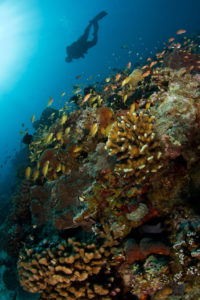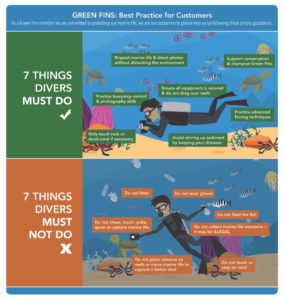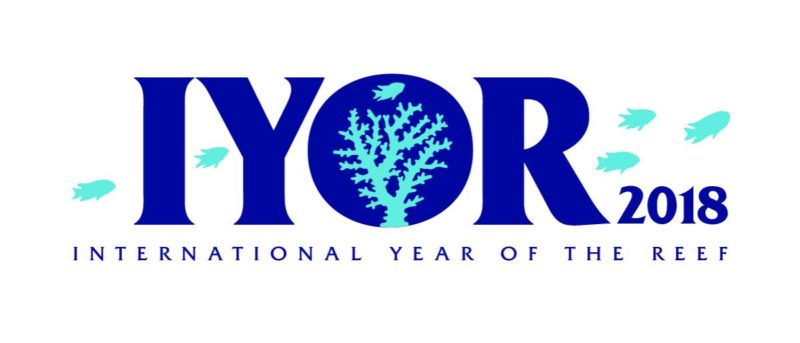Divers, more than most people, appreciate the value of coral reefs. They have seen firsthand a reef’s stunning beauty and, in recent decades, alarming damage and bleaching. This year marks the third International Year of the Reef, an opportunity to celebrate and protect the reefs that are so vital to ocean health.
The third International Year of Reef (IYOR) in 2018 will be a year of opportunity to build a strong movement and collaboration between citizens, divers, organizations and government. Fundamental policy and behavior change is necessary to preserve coral reefs and related ecosystems.
Many initiatives, workshops, creative events and collaborations will take place throughout the year. These will not only bring scientists and policymakers closer together, but also encourage citizens and divers to take small actions that count. Green Fins thusly provides people with the tools to act for marine conservation and sustainable development of coral reefs and related services.

What’s the history of IYOR?
International Year of the Reef began in 1997, the year of the worst coral bleaching recorded up to that date. Globally, around 225 organizations in 50 countries and territories participated. The event generated more than 700 articles, and scientists performed hundreds of surveys. IYOR 1997 increased awareness and understanding of the values and threats to coral reefs, and influenced conservation-related research and management efforts.
The second IYOR took place in 2008. There were more than 630 events and two-thirds of the countries and territories that contain shallow-water coral reefs participated. The IYOR 2008 campaign strengthened global awareness of the ecological, economic, social, and cultural value of coral reefs and the threats facing them. It brought attention to coral reefs as a source of livelihood, coastal protection, and income to over 500 million people around the world.
The third International Year of the Reef
The previous IYORs shone a spotlight on coral-reef conservation globally. The International Coral Reef Initiative (ICRI) declared 2018 as the third International Year of the Reef to help bring the informed opinions of global scientific leaders to policy-makers worldwide, demonstrating that inaction and business-as-usual is no longer possible. The main aims of IYOR 2018 are to:
- Support the implementation and strengthening of the Paris Agreement and the target reductions in atmospheric carbon dioxide and encourage timely actions from signatories.
- Support and expand existing local reef-management efforts including MPAs, coastal and marine spatial planning, stewardship of watersheds and catchments where activities affect reefs.
- Inspire and support public outreach, including citizen science and other forms of community engagement.
- Support science-based coral-reef restoration efforts, and ensure that these are better coordinated and grounded in the best available science, with standardized methods and data processing where possible.
The year-long campaign will consist of events such as science workshops, dive shows, beach clean-ups and art exhibitions. The official launch of IYOR 2018 will take place at the ICRI annual meeting in Nairobi in December, with a regional European IYOR launch the same month at the European Coral Reef Symposium (ECRS) in Oxford, U.K.
What are the threats to coral reefs? Are divers influencing reefs?
Underwater observers, divers and snorkelers are at the front line of coral reef protection. They are the eyes and ears of the reefs and are usually the first to see bleaching and damage. As a diver, you may have noticed pale or white coral reefs. When diving over long period in the same area, or sometimes even in new areas, you may have noticed fewer fish and seldom encountered any big pelagics as compared to the past. You may also see traces of destructive fishing practices.
On a much smaller scale, but still significant, divers and the diving industry can negatively impact coral reefs. Sewage disposal from diving businesses and boats, anchoring that damages the reefs, fish feeding, touching marine life, direct damage from finning or stepping on coral and stirring of sediment can all damage a reef. The cumulative effect of these actions within a thriving global tourism industry makes these impacts relevant. Additionally, figures predict an increase in tourist numbers in the future. But, will there be business without healthy coral reefs?
The dive industry is gearing up with Green Fins
Although people often feel powerless to tackle climate change, divers can nonetheless help make coral reefs stronger. In some cases, we can even help un-bleach a reef by reducing these local direct pressures. Divers and the diving industry can raise awareness about reef conservation, minimize impacts from diving activities, and help coral reefs become more resilient to large-scale threats.
By 2020, The World Tourism Organization predicts that a record 1.4 billion tourists will cross international borders in a single year. A fair number of them will be divers and snorkelers. With that many people in the water, odds are that professional divers are going to see increasingly irresponsible tourist behavior, further threatening already stressed reefs. The Reef-World Foundation, with its Green Fins initiative, is mitigating tourism risks by building diver awareness and helping dive centers and governments globally to cope with current and future threats.

What is Green Fins?
Green Fins is a globally scalable, comprehensive approach. It encourages tourists, dive centers and snorkel operators, local communities and governments to work together to reduce their environmental impacts. The Code of Conduct helps dive centers mitigate their impacts when carrying out marine tourism activities. The Code of Conduct consists of 15 points, which target environmental threats posed by the tourism industry, both underwater and on land. Through Green Fins, the dive center receives annual environmental assessments, training and feedback to help them implement the code. This not only standardizes membership but also allows a system for validation, measurable progress and collaboration between stakeholders. The membership is free.
An ever-expanding network of businesses in Indonesia, Malaysia, Maldives, Philippines, Thailand, Vietnam, Palau and Indonesia are involved in the initiative, with plans for expansion.
Green Fins directly helps reduce the negative local impacts of the scuba and snorkeling tourism industry. It also helps governments meet specific targets of the Convention on Biological Diversity and the 2030 Agenda for Sustainable Development.
What can you do?
With increased pressure from climate change, destructive fishing practices, overfishing, coastal development and tourism, we must act. The IYOR 2018 is a reminder of the coral-reef crisis and an opportunity to address it. Following the Green Fins’ best practices, we can improve coral-reef resilience locally. How will you support the movement to protect the reefs you love? Below are a few suggestions:
- Join the IYOR 2018. Then, organize, host, or join an event to raise awareness, initiate a public dialogue or engage an influencer.
- Inform yourself and others about the threats to and the value of coral reefs and related ecosystems. Promote marine conservation. Here are some relevant resources:
- Two Minutes on Oceans video featuring the Green Fins program
- Recently released film Chasing Coral
- Learn about the Green Fins Program and adopt the Green Fins Handbook.






